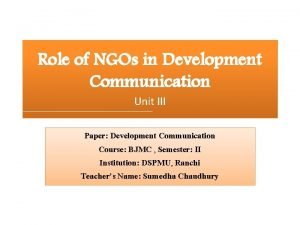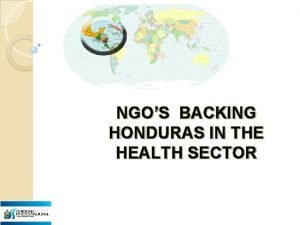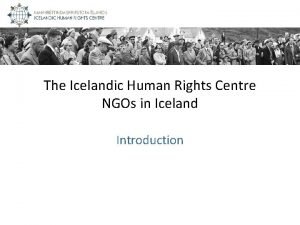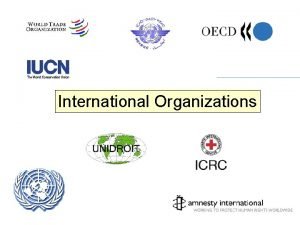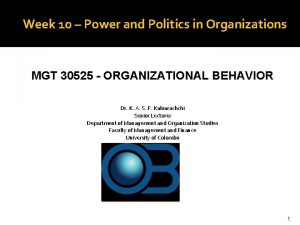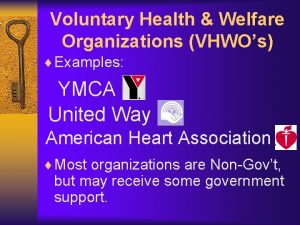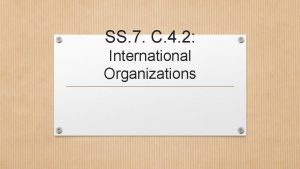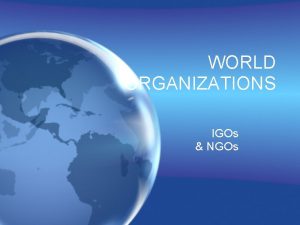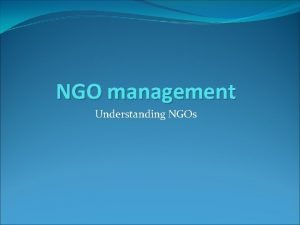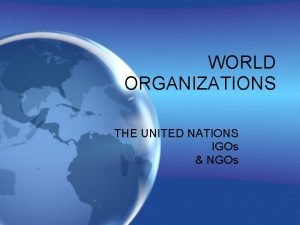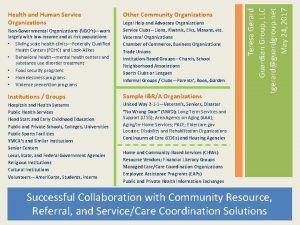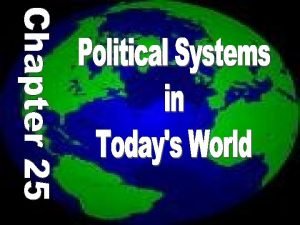NonGovernmental Organizations WORLD ISSUES 120 NGOs what are














- Slides: 14

Non-Governmental Organizations WORLD ISSUES 120

NGOs – what are they? NGOs are non-governmental organizations. NGOs have developed to address humanitarian issues, developmental aid, and sustainable development. Helping with issues like: health care, education, human rights and the providing clean drinking water. An NGO will not be constituted as a political party; it will be non-profit-making and it will be not be a criminal group, in particular it will be non-violent.

$$ Money $$ They are largely funded by private and/or government donations. Unfortunately, most NGOs do not have sufficient financial resources of their own and find it difficult to raise resources. But, more than the financial help, the voluntary and the overall private sector can bring with it dedicated people, expertise and skills that are much needed in order to improve the status of the groups.

NGOs – How many can you list? NGOs can be huge - like the Red Cross, or small like - One Child's Village. Either way they play a role in making the world a better place to live. List as many NGOs as you can in your notes!

How do NGOs help? NGOs can make significant contributions in the following areas: Community mobilization - encouraging community participation Provide a voice for those less fortunate Experiments and innovations with technology not available to some communities (https: //www. youtube. com/watch? v=q. Me. X 2 D 4 AOj. M) (https: //vimeo. com/26638815) Research and evaluation including data gathering and processing. Providing outsourced services that the government cannot deliver or deliver efficiently. (Health care, education, sanitation, etc. )

Campaigning vs. Operational NGOs typically exist to advocate (Campaign) or to provide a service (Operational) for a specific group.

Operational NGOs achieve small-scale change directly through projects. They have to mobilize resources in the form of financial donations, materials, and volunteer labor in order to sustain their projects and programs.

Campaigning NGOs achieve largescale change indirectly through influence on the political system. Fundraising is still necessary, but on a smaller scale. Persuading people to donate their time is more important; successful campaigning NGOs have the ability to mobilize large numbers of people for certain issues and events.

International vs. Local NGOs Two other ways we can categorize NGOs is either international NGOs (INGOs) and “local” NGOs. International NGOs are large groups often based in the U. S. , Geneva or London but work and have offices around the world. Examples include: Human Rights Watch, Oxfam, Amnesty International and the Red Cross. Local NGOs serve a particular region, country, section of a country or municipality and are housed in the region, country or municipality on which they focus. Examples include: IWK Hospital Foundation, Piggs Peak Partnership.

What issues do NGOs work on? One major area of international practice is human rights. Not just addressing mass atrocities (genocide and political killings by the government) but also issues like improving prison conditions, the right to an education and the right to housing. Some NGOs tackle business practices of particular companies or industries. You need only stop by your local Starbucks and look for the “fair trade” coffee on sale to see the results of a successful campaign by the San Francisco-based NGO Global Exchange. Some organizations focus on economic development, particularly in developing countries. For example, one NGO in India helps women set up their own small businesses as a way of helping them achieve economic self-sufficiency.

What issues do NGOs work on? Other NGOs work on transitional justice or government/law reform issues. A large number of humanitarian and relief agencies exist and will sometimes employ attorneys to carry out the following objectives: establishing the truth, providing victims a public platform, holding perpetrators accountable, strengthening the rule of law, providing victims with compensation, effectuating institutional reform, promoting reconciliation and promoting public deliberation. A growing number of NGOs, both U. S. - based and “local, ” are working on environmental and public health issues. There also NGOs that work specifically on women’s issues and NGOs that focus on children’s issues.

Advantages & Disadvantages of NGOs Advantages: Disadvantages: Ability to experiment freely Constant funding difficulties Flexible in adapting to local needs Possible lack of legitimacy Enjoy good rapport with people Ability to communicate at all levels Difficult to regulate – lacking in transparency and accountability Ability to recruit experts and highly motivated staff Can be ineffective due to lack of coordination Less restrictions from the government


Hampton Piggs Peak Partnership Community Partnership between Hampton, NB, Canada - Piggs Peak Swaziland Mission: connect communities to reduce the devastating impact of HIV/AIDS in Swaziland by providing help, hope, and opportunity for a better future… one person at a time. Projects: School Fees Girls Latrines Grandmother Partnership Tyler Henderson Swaziland Scholarship of Hope Vegetable Garden Other: Clothing, school bag and rain coat collection
 Mikael ferm
Mikael ferm Non-governmental health agencies are funded primarily by
Non-governmental health agencies are funded primarily by Role of ngo in development communication
Role of ngo in development communication Role of ngos
Role of ngos Ngos in honduras
Ngos in honduras Ngos in iceland
Ngos in iceland 120px x 120px
120px x 120px 140+120+120
140+120+120 World organizations
World organizations Youth organizations in great britain
Youth organizations in great britain Power and politics in organizations
Power and politics in organizations Voluntary health and welfare organization examples
Voluntary health and welfare organization examples Compare and contrast business organizations
Compare and contrast business organizations Guided notes international organizations
Guided notes international organizations Performance measurement in decentralized organizations
Performance measurement in decentralized organizations


